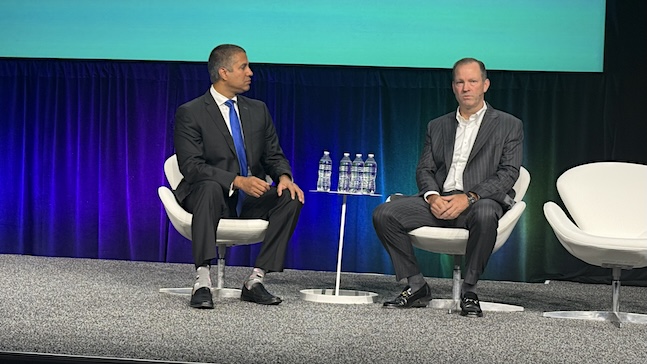World
Industry Leaders Urge Quick Action on New Spectrum Access

At the Mobile World Congress 2025 in Las Vegas, industry leaders called for swift action to utilise additional spectrum made available by the recently passed legislation known as the One Big Beautiful Bill, signed into law by former President Donald Trump in July 2023. The bill not only reinstated the Federal Communications Commission (FCC)’s authority to conduct spectrum auctions but also included provisions for access to the 800MHz band.
During his keynote address, CTIA CEO and President Ajit Pai emphasized the need for regulators to take decisive action. Quoting the iconic Star Wars character Yoda, he urged, “to do, not try,” stressing the importance of expanding the telecom industry’s access to spectrum. “Spectrum is a key driver of innovation, not just for the mobile industry, but for adjacent technologies like artificial intelligence, the cloud, fixed broadband, and much more,” he stated.
Pai, who previously served as chair of the FCC during Trump’s first term, noted that the United States had once been a leader in 5G technology. “The president bet on wireless innovation back then, and the wireless industry delivered,” he said. However, he pointed out that the U.S. has since fallen behind, with China now taking the lead in 5G availability.
The passing of the One Big Beautiful Bill represents what Pai described as a “clear repudiation of policy inertia” that has hindered progress in recent years. He stressed that the new legislation provides a vital opportunity to empower American entrepreneurs and benefit wireless consumers, but cautioned that merely having potential is not sufficient. “Identifying bands and setting an ambitious target is not the same as making spectrum available,” he added.
Call for Execution and Long-Term Planning
Joining Pai on stage, Kyle Malady, CEO of Verizon Business and chair of CTIA, echoed these sentiments, highlighting the importance of licensed spectrum for various sectors, including healthcare and manufacturing. “When operators use licensed spectrum, CIOs across these sectors are more willing to invest in mission-critical applications,” he explained.
Malady underscored the ongoing concern among carriers regarding capacity. He stated, “If you give us enough capacity, then we can build ecosystems and platforms that allow small businesses to grow.” He also emphasized the significance of regaining authority over spectrum allocation and the importance of the 800MHz band, while urging the industry to move forward decisively. “We need to execute now,” he said.
Furthermore, Malady called for a collaborative effort between the industry and government to effectively leverage the newly available spectrum while developing a long-term strategy. “We kind of live a little bit hand-in-mouth as an industry,” he remarked. “We need to figure out what it’s going to be ten, 20, 30 years from now so we’re not just scrambling at the last minute.”
As the industry stands at a pivotal moment, the urgency for action on spectrum access has never been greater. With the right steps, leaders believe the U.S. can reclaim its status as a global leader in telecommunications and technology.
-

 Lifestyle3 months ago
Lifestyle3 months agoLibraries Challenge Rising E-Book Costs Amid Growing Demand
-

 Sports3 months ago
Sports3 months agoTyreek Hill Responds to Tua Tagovailoa’s Comments on Team Dynamics
-

 Sports3 months ago
Sports3 months agoLiverpool Secures Agreement to Sign Young Striker Will Wright
-

 Lifestyle3 months ago
Lifestyle3 months agoSave Your Split Tomatoes: Expert Tips for Gardeners
-

 Lifestyle3 months ago
Lifestyle3 months agoPrincess Beatrice’s Daughter Athena Joins Siblings at London Parade
-

 World2 months ago
World2 months agoWinter Storms Lash New South Wales with Snow, Flood Risks
-

 Science3 months ago
Science3 months agoTrump Administration Moves to Repeal Key Climate Regulation
-

 Business3 months ago
Business3 months agoSoFi Technologies Shares Slip 2% Following Insider Stock Sale
-

 Science3 months ago
Science3 months agoNew Tool Reveals Link Between Horse Coat Condition and Parasites
-

 Science2 months ago
Science2 months agoSan Francisco Hosts Unique Contest to Identify “Performative Males”
-

 Sports3 months ago
Sports3 months agoElon Musk Sculpture Travels From Utah to Yosemite National Park
-

 Science3 months ago
Science3 months agoNew Study Confirms Humans Transported Stonehenge Bluestones









